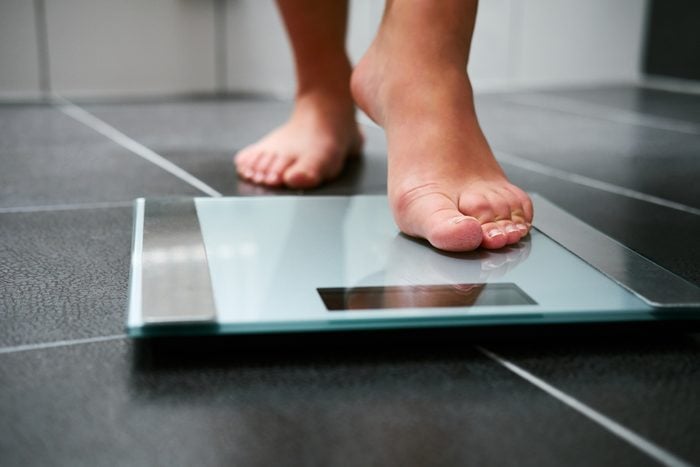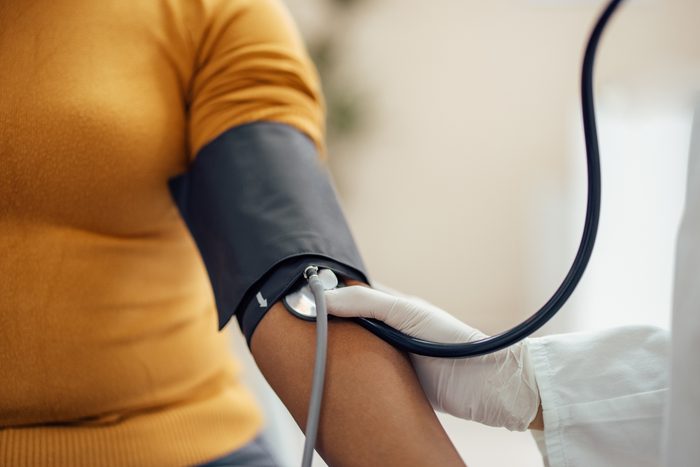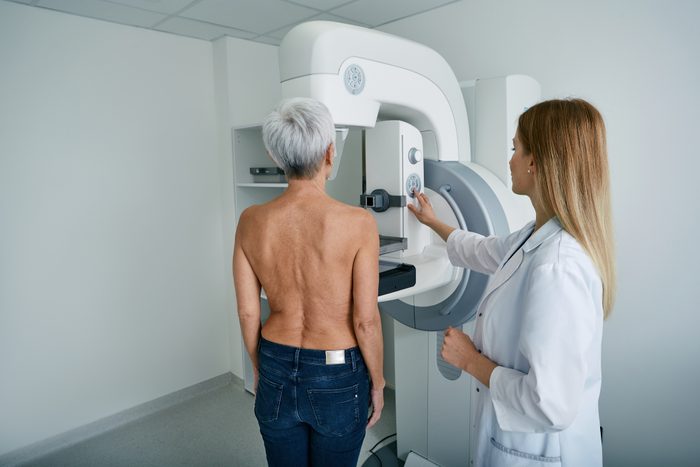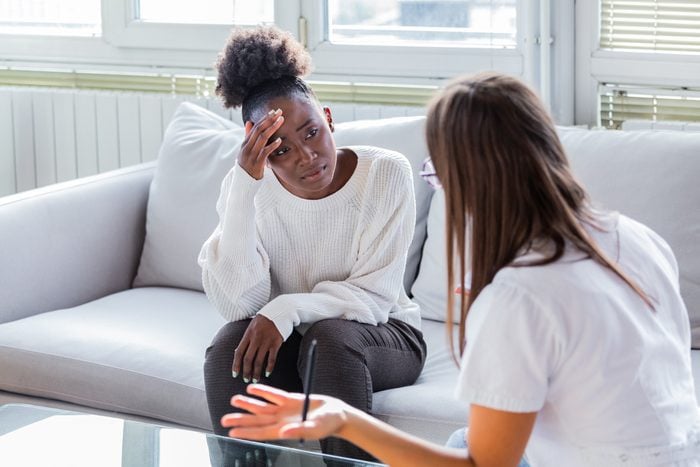
Many queer women are facing a healthcare crisis. Marianne Snyder, PhD, MSN, RN published a review of studies in 2019, suggesting that many lesbian and bisexual women continue to encounter healthcare providers who are insensitive to their needs and less educated about their health risks.
While Dr. Snyder noted change is occurring, gaps in care still exist—and this can have major consequences for a woman’s health. According to a 2020 study in the Journal of Women’s Health, queer women experience higher rates of chronic disease and mental health conditions, despite no physiological difference from their heterosexual counterparts.
“Advocating for yourself is never easy, especially in a space where you feel stigmatized,” says Victoria Metcalf, LCPC, an LGBTQIA specialist and clinical director at Recovery Centers of America Capital Region. But even as clinicians become more culturally aware, it’s important to be direct and ensure your needs are met in the clinical setting.
Experts who work with patients in the LGBTQ community say asking these questions can help overcome doctors’ assumptions and ease your medical anxiety at your next appointment.
What Is Medical Gaslighting? 9 Doctors’ Statements That Are Major Red Flags

1. “What experience do you have working with queer women?”
Research has shown that having a comfortable, trust-based relationship with your doctor leads to better healthcare outcomes—and for queer women, that means being forthright about your search for a provider who is LGBTQ-competent, says Amir Ahuja, MD, director of psychiatry at Los Angeles LGBT Center and advocate of the Depression Looks Like Me campaign.
He says to be open about your identity and ask your doctor if they have any specific training, certification, or organizational membership related to working with LGBTQ+ clients. “That’s something you can look up as well,” adds Madison McCullough, LCSW, a queer therapist with a private practice in New York who says many providers today will indicate on their website that they have experience working with the queer community. “Look at things like the paperwork, too,” she says. “Are they asking about your sexual orientation and gender identity? If so, what’s included on that menu—does it feel restrictive?”

2. “Should I make any lifestyle changes?”
A US government report released in June 2023 suggested sexual minorities face unique stressors that contribute to higher rates of substance use, including drinking, smoking, and illicit drug use. Research has also shown lesbian and bisexual women are more likely to experience being overweight, obese, or deal with eating disorders than straight women.
Being honest about your habits and behaviors with your healthcare provider is crucial. “Many people may not even realize how much their [substance] use negatively impacts their life,” Metcalf says.
She says that together, these lifestyle behaviors lend themselves to greater rates of mental health issues, for instance—but they’re also spelling trouble for women’s heart health. Evidence shows that women are already undertreated when it comes to heart disease, and a new report from the American Heart Association (AHA) says that this disadvantage is even greater for lesbian and bisexual women.

3. “What is my risk for chronic disease?”
“For adult women, the typical entry into the healthcare system is pregnancy,” says Ryan Sultan, MD, a Columbia University professor and doctor who specializes in working with the LGBTQ+ community. “For so many women, their OBGYN becomes their de facto primary care doctor.”
But data show lesbian women’s pregnancy rates are far lower, he explains—so in addition to problems like discrimination in healthcare, these structural gaps exist. “Once you’re over 35, you’ve entered into many categories.” It’s important that a doctor is screening you for conditions like cancer, diabetes, high cholesterol, and high blood pressure.

4. “Do I need a Pap smear, HPV test, pelvic exam, or breast exam?”
“I’ve seen many lesbian women who feel uncomfortable talking to their providers about breast cancer screening and cervical cancer screening,” says Renaldo Barrios, NP, a primary care provider with an emphasis on LGBTQIA care with One Medical. There’s a misconception that if you’ve never had sex with a man, you’re not at risk for contracting the human papillomavirus (HPV), which is flatly untrue, Barrios says. HPV causes more than 95% of cervical cancers, but the World Health Organization says it’s also one of the most curable forms of cancer if it’s caught early.
Research, such as one 2017 study, has shown lesbian women are 25% less likely to undergo these preventive tests—and the American Cancer Society suggests this contributes to trends of increased risks for cervical, breast, and ovarian cancers among lesbian women.

5. “Is birth control right for me?”
While birth control options like hormonal contraceptives and IUDs are largely marketed to heterosexual women, they can help treat issues even if you’re at a lesser risk of getting pregnant.
This includes treating heavy, painful, or irregular periods, endometriosis, premenstrual dysphoric disorder (PMDD), acne, and hair loss. Still, birth control can have unwanted side effects for women regardless of their sexual identity—so if it’s not for you, ask your provider about non-hormonal alternatives to treating these issues.

6. “Can I get a mental health screening?”
To treat you properly, your doctor needs the full picture of your health—and that includes your mental health. It’s important to bring up any mental or emotional struggles you’re dealing with so your doctor can determine if there are underlying physical issues at play or problems with any medications you’re taking. Keep in mind an LGBTQ-competent doctor you trust is likely to be a good resource for referrals to a mental health specialist, as well.
Keep in mind that primary care doctors can and may prescribe medications like selective serotonin reuptake inhibitors (SSRIs), McCullough says. While this may be suitable for you, mental health medications treat symptoms—not the root causes. Because the LGBTQ+ community faces unique mental health challenges, “finding your way to [a mental health professional] who specializes in this area is really important,” whether you’re taking medication or not.

7. “Is this abuse?”
Intimate Partner Violence (IPV) is common in the LGBTQ+ community, says Dr. Ahuja says. But certain stigmas and internalized perceptions of what constitutes violence exist, and that stands in the way of people seeking help.
For instance, according to recent research, queer women experience psychological IPV far more than physical forms and at a disproportionately greater rate than heterosexual women, but often feel ashamed, blame themselves, or question whether they’ll be heard if they seek help.
Dr. Ahuja emphasizes if you feel unsafe in your relationship in any way—physically, sexually, verbally, or emotionally—understand this is a common situation, but it is not healthy. Healthcare providers are trained to provide help.
19 Red Flags You’re Being Manipulated, According to Therapists

8. “What do you need to know about my sex life?”
If you feel uncomfortable broaching the topic of your intimate life with your doctor, research from the Centers for Disease Control and Prevention (CDC) suggests that concern may be founded—lesbian women are less likely to receive a sexual risk assessment than heterosexual women. “Providers can get especially weird about things like talking about sex with folks living at the margins of gender and sexuality,” McCullough explains. This situation can often come down to doctors’ ingrained (and possibly heteronormative) assumptions about your identity, such as your sexual activity, behaviors, and your partners’ sexual experiences.
It’s important to bring this up with your doctor, explains Jennifer Anger, MD, urogynecologist and co-author of A Woman’s Guide to Her Pelvic Floor: What the F*@# is Going On Down There? “There is a mismisconception that lesbians do not have to use protection,” she says. “Although risk is lower than for vaginal or anal intercourse, lesbians can transmit STDs through genital-to-genital touching, manual stimulation, oral sex, or sharing sex toys.”
Plus, sexually transmitted infections (STIs) like gonorrhea and chlamydia don’t cause symptoms in many women, Barrios says—so it’s important to get regularly tested.

9. “If I want to be a parent, what are my options?”
Even if you haven’t decided whether or not you want children, having these conversations proactively with your doctor helps you understand your future options and, depending on your age, strategies like fertility preservation. “Lesbian couples have multiple options when it comes to becoming parents, including pursuing biological parenthood or adoption,” says Mark Leondires, MD, the founder and medical director at Illume Fertility and founder of Gay Parents to Be. “Biological parenthood pathways include artificial and intrauterine insemination (IUI) using donated sperm, in vitro fertilization (IVF), and reciprocal IVF (RIVF).”
Additionally, he says, a couple will need to decide if one or both partners want to carry a pregnancy. “If one or both partners wish to be biologically related to their children, they will need legal and mental health support to screen sperm donors and to make sure that parental rights are secure for each parent.”
Get The Healthy @Reader’s Digest newsletter and follow The Healthy on Facebook, Instagram, and Twitter. Keep reading:
- 11 Questions Every Transgender Person Should Ask Their Doctor, Say Experts
- Country Artist Brandy Clark on How Much LGBTQ Representation Means for Mental Health
- The 12 Absolute Best Commuter Bikes & E-Bikes for Getting Around in 2023, from Industry Experts and Bike Enthusiasts
- This Nightly Habit Could Reduce Your Risk of Heart Disease, Says New Study
